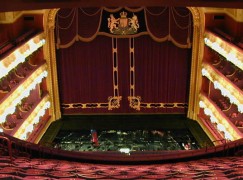Trouble in Venice as tenor spurns white-face Otello
OperaFrancesco Meli is due to sing Verdi’s Otello at La Fenice.
He expected the director to give him some make up to darken his features when portraying the great Moor. But the director Fabio Cerese refused, saying he did not want the character depicted that way.
Meli has gone to the media, telling Il Giornale: ‘I do not agree with being a white Otello.’
He has more to say: ‘Otello’s geographical origin and therefore his skin color have a dramatic value; the thesis is that the white Iago is the evil one who goes to instigate Othello, leading him to commit a crime.
‘Opera has lost the connotations of its identity, (which) musicals and ballet still retain. When you go to see Tchaikovsky’s Swan Lake you want to see the swans, the feathers, just as no one dreams of the Phantom of the Opera set in the Bronx or in a garbage dump. The paradox is that we have opened ourselves to dialogue with the public, but we are losing the public.’
Go argue with that.






Comments